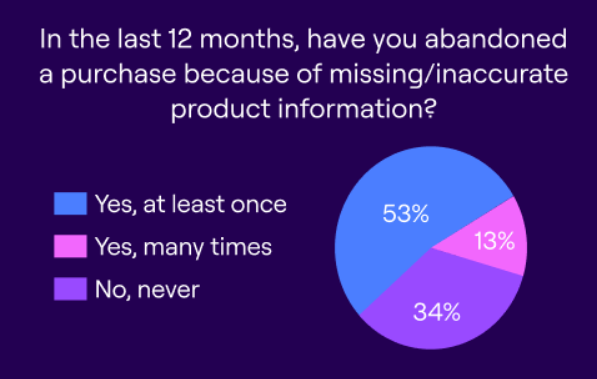Key takeaways
- Consumer critiques now outweigh influencer endorsements in credibility.
- Two-thirds of shoppers abandon purchases on account of poor product data.
- Personalization drives loyalty, however AI have to be clear to construct belief.
- Values-based commerce is rising, with sustainability linked to willingness to pay extra.
- Omnichannel accuracy and seamless experiences are baseline expectations.
A brand new Akeneo survey reveals that peer critiques, not influencers, are shaping belief and loyalty within the world retail panorama
The fashionable shopper journey has grown more and more advanced. Consumers now work together with a median of six touchpoints earlier than buying, mixing digital and in-store channels with expectations for accuracy, personalization, and authenticity.
A brand new global B2C survey from Akeneo, which surveyed 1,800 shoppers throughout eight international locations, reveals one of the crucial hanging insights: clients belief one another’s voices greater than influencers or consultants. This shift has vital implications for a way manufacturers method credibility, loyalty, and advertising and marketing methods in 2025 and past.
The Belief Hierarchy: Critiques Outweigh Influencers
Akeneo’s analysis underscores a significant improvement within the world retail panorama: consumer critiques now sit on the high of the belief hierarchy. Two-thirds of shoppers globally reported shopping for merchandise primarily based on peer suggestions. Whereas greater than half additionally acknowledged making purchases influenced by influencer suggestions, the load of credibility skews towards fellow buyers.
This discovering doesn’t negate the function of influencers — notably in magnificence, trend, wellness, and sports activities classes, the place they continue to be extremely persuasive — but it surely indicators that genuine, unfiltered peer-to-peer content material has grow to be the gold commonplace of credibility. Shoppers more and more need proof that somebody like them has used the product and located worth.
For entrepreneurs, this recalibrates the function of social proof. Influencer activations might drive consciousness, however critiques and customer-generated content material at the moment are the cornerstone of conversion.
Learn additionally:
Accuracy because the Bedrock of Commerce
Belief doesn’t finish with critiques; it begins with correct data. The report exhibits that two-thirds of shoppers deserted a purchase order up to now 12 months on account of lacking or incorrect product particulars. This discovering highlights how product data administration (PIM) is now not simply an operational activity — it’s a income driver.
Much more compelling, almost half of world buyers mentioned they’d pay a premium — a median of 25% extra per product — if retailers offered full and dependable product content material. That willingness to pay illustrates a rising linkage between knowledge high quality and perceived model worth. Incomplete content material not solely weakens gross sales however damages credibility long-term.
Learn additionally:
Learn additionally:
Take a look at the Creators Power the Full Holiday Purchase Funnel (Study Confirms)
Personalization and the Position of AI
Customized purchasing is rising as one other trust-builder. Two in 5 shoppers would pay additional for experiences tailor-made to their preferences, with many citing stronger loyalty to manufacturers that ship relevance at each touchpoint.
Synthetic intelligence sits on the coronary heart of this development. Instruments like AI-powered assistants and advice engines are serving to buyers reduce by means of noise and make assured decisions. But the report additionally highlights a fragile pressure: whereas shoppers embrace personalization, they continue to be cautious of opaque AI use. Issues about privateness, misuse, and impersonality persist, making transparency in AI deployment important to long-term belief.
Learn additionally:
Learn additionally:
Take a look at the The Role of AI Personalization in eCommerce Growth
Values Matter: Sustainability and Transparency
One other key dimension within the fashionable shopper’s mindset is the alignment of name values with shopper values. The survey discovered that 42% of shoppers would spend extra if manufacturers clearly communicated their sustainability efforts, provide chain practices, or moral requirements. This group was keen to pay a median of 24% extra for such assurance.
But the report additionally exhibits that product content material usually fails to convey these values adequately. The takeaway for manufacturers is obvious: sustainability, transparency, and values communication should transfer from peripheral messaging into the core of product storytelling.
Learn additionally:
Learn additionally:
Take a look at the Snapchat Report Unpacks Gen Z’s Diverse Mindsets
Omnichannel because the Default
Shoppers now not suppose by way of “on-line” versus “offline.” They anticipate seamless integration. Akeneo’s findings present that just about three-quarters of buyers use a number of channels all through their journey, with bodily retail shops and digital marketplaces usually overlapping.
The implications are substantial: buyers need constant, high-quality product data whether or not searching in-store, on a model web site, or on a market. Add to this the expectation of free returns, quick supply, and straightforward processes, and the baseline for acceptable buyer expertise has risen dramatically.
For manufacturers, omnichannel accuracy just isn’t a bonus — it’s a requirement.
Learn additionally:
Learn additionally:
Take a look at the What Are the Key Factors That Influence Consumer Behavior
Implications for Entrepreneurs and Manufacturers
The report gives a roadmap for manufacturers navigating the trendy retail panorama:
- Re-center credibility on critiques. Peer suggestions carries the strongest affect on buy selections and ought to be amplified in digital experiences.
- Steadiness influencer campaigns with genuine voices. Influencers stay helpful for discovery, however buyer critiques and UGC anchor belief.
- Spend money on product data administration. Excessive-quality, constant product content material can straight enhance gross sales and cut back expensive returns.
- Be clear with AI. Personalization wins loyalty, however solely when shoppers perceive how their knowledge is getting used.
- Showcase model values. Sustainability and ethics are now not non-compulsory narratives; they’re buy drivers.
- Ship seamless omnichannel journeys. Belief and loyalty rely on consistency throughout each touchpoint.
Collectively, these findings reinforce a brand new actuality: belief is fragmented, however it’s also extra measurable than ever. Manufacturers that mix peer validation with accuracy, personalization, and values-driven transparency shall be greatest positioned to win buyer loyalty in 2025.
The Way forward for Belief in B2C
The Akeneo B2C survey paints a transparent image of an empowered, values-driven, and digitally fluent shopper. The standout lesson is that clients usually tend to belief one another than influencers — and that belief extends throughout each ingredient of the acquisition journey, from correct product knowledge to constant omnichannel experiences.
For manufacturers, the problem just isn’t solely to satisfy these expectations however to combine them right into a cohesive technique that sustains loyalty in an more and more crowded market.

